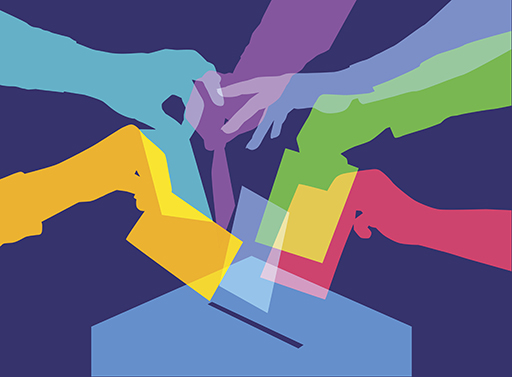1.1 What is active citizenship?
A good place to start in making change is understanding what citizenship actually means.
Political citizenship can be thought of in a narrow and broad sense. Narrowly, it refers to someone’s ability to engage in electoral politics (so, voting in elections and the things that go with that, like supporting a political party and standing for political office), which is closely tied to a person’s citizenship status (the legal right to live in a state, e.g., someone is a citizen of the UK or of Australia or of India etc.).
More broadly, it refers to the ability a person has to engage politically in other ways. This could be closely tied to the narrow sense of political citizenship, for example, political protest, or signing a parliamentary petition. Or it could be less obvious. Indeed, there are things we do which can be considered political, even if we don’t see them as obviously political. For instance, it could be considered a political act to choose to read (or not to read) a certain newspaper, as that newspaper may have a political stance. Or to sign up to use, or delete, a social media account, as the company behind it may be run in a way that you agree or disagree with. In this sense you ‘do politics’, and are political citizens, in a multitude of ways every day, sometimes knowingly, sometimes unknowingly.
Recently, there has been a move towards an ‘active’ understanding of citizenship, focusing on the ‘acts’ and ability of individual people to influence the society they are part of. Active citizenship is the idea that someone can be an active political citizen; they can actively try and make change (or indeed prevent it). They can be a ‘changemaker’. To do so, they need to be motivated to participate as well as kept informed about politics, democracy and the workings of society. There is also an element of personal responsibility, i.e. they need to make the effort to engage.
Active citizenship is not a static term: it can be understood on a spectrum (Wood et al, 2018). It can be understood in a minimal sense (activities which relate to ‘personal responsibility’, such as obeying the law and paying taxes), all the way to a maximal sense, focusing on combatting injustice in society, defined by Westheimer and Kahne (2004) as ‘justice orientated’ citizenship. It is clear there are different ‘levels’ of active citizenship and, linked to this, questions about just how active an individual should be. Whatever approach a person takes, active citizenship is important for democracy, as is developing an understanding of what active citizenship means and involves; this is particularly the case in countries where democracy is at risk, but it applies everywhere.
This course is positioned more towards the ‘maximal’ end of the active citizenship spectrum, although it will be of use to anyone with an interest in political and social change. Indeed, research has shown that citizens need both deep knowledge about the social issue they are interested in, as well as the ability to think critically about it, i.e. how can their action lead to change? What are the different perspectives about the issue? Is the issue a contested one? (Wood et al, 2018; Westheimer and Kahne, 2002). They also need a range of practical skills and understandings to make real-life change within a democracy, including how to communicate effectively (Wood et al, 2018).
An Introduction to Political and Social Change is a great place for potential changemakers to start.

